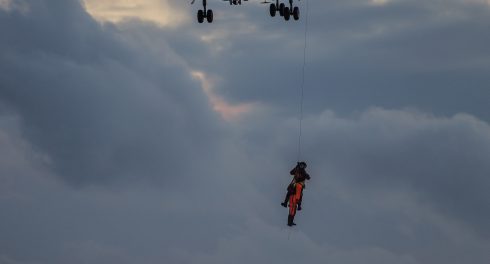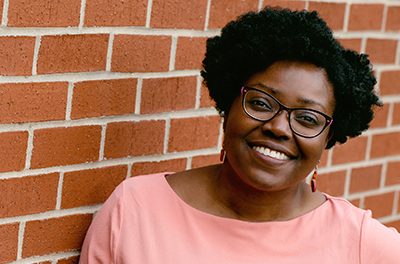Highlight:
- Ears open
- Community first
- Books that won’t balance
- Owning up
- Throttling up
- TAI Spotlight: Chandler Foundation joins the TAI collaborative
Ears Open

Photo credit: VirtualSpeech
We start close to home this week with today’s launch of TAI’s new 2020-24 strategy. TAI Executive Director Michael Jarvis explains the approach of TAI donor members to reinforce what we fund, how we fund, and the funder landscape and why transparency, participation, and accountability matter more than ever in the current context. We are also excited to welcome Chandler Foundation as the newest member of the collaborative for this next chapter.
TAI’s strategy is informed by an evaluation on what we gathered from listening to our funder members. For their part, Jorge Florez and Nada Zhody shares what Global Integrity and partners are learning by listening to the Open Gov Hub community and how it is helping then navigate the impacts of COVID-19 and what they have learnt from listening to their community. Feedback Labs urge funders to listen to the non-profits they support and the communities they serve in shaping their responses and have developed a Listening Framework to help.
We expect Katy Love and Winifred Ollif will applaud use of that tool as they advocate for participatory grantmaking online during this pandemic. Their reason? “The impacts of COVID-19 are disproportionately experienced by people who are often left out of decision-making, it’s critical for philanthropy to make this change now.” To complement, don’t miss reasons why foundations engage in collaborative efforts, how they can do it right by putting equity to the fore, and inspiration on how corporate foundations can deliver scalable and sustainable impact.
Will this all translate to more effective civil society support? DFID announced £45 million in coronavirus funding for NGO awardees, but its far short of what has been requested. Political and aid leaders have also pointed out that money is “slow getting to front-line actors” – less than 2% of funding committed under the Global Humanitarian Response Plan has so far made it to NGOs. It’s unlikely to help that Oxfam is to withdraw from 18 countries.
Essential Listening #1: Where is the power in the pandemic?
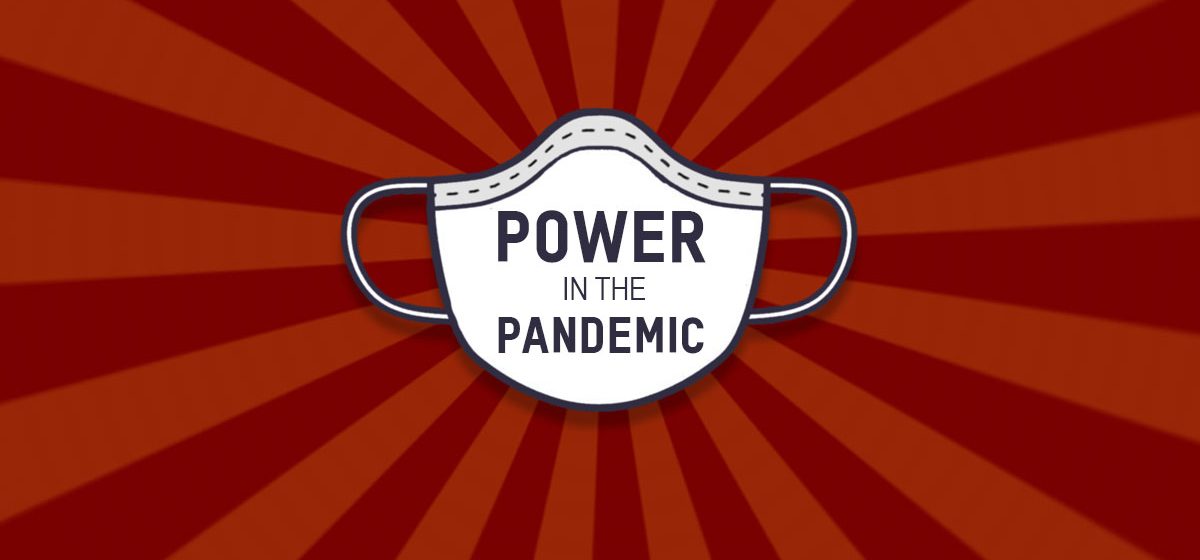
Image Credit: Oxfam blogs
In the first of many series to come, Oxfam’s Power Shifts and Oxfam in Depth podcast has launched a new podcast + transcript series that features human-centered stories and experience with COVID-19 and how different communities are organizing in response. Find answers to what’s emerging, rising and filling the gaps in the cracks of the coronavirus crisis.
Community first
Turning to the community level, Ella Scheepers, Ishtar Lakhani, and Kasey Armstrong shared lessons on community organizing practice as Saul Mullard and Per Aarvik highlight the potential of online collaborations for social accountability during the crisis: “It is tempting to view the current lockdowns and restriction of movement as a global paralysis. However, whilst challenging for civil society, the current situation may stimulate creativity and offer new opportunities for it as a watchdog.” One case in point – the work of Mexicans Against Corruption and Impunity in challenging the Mexican Government on underreporting of COVID-related deaths. Looking for more inspiration on civil society action? Checkout Integrity Action’s roundup of social accountability responses to COVID-19.
Naomi Hossain recalls growing up under curfew and coups and reflects on how COVID-19 makes all state fragile; making transparency and accountability more important than ever. “Among the lessons of COVID-19 is the vital importance of political trust, of space for civil society and of strong communities in coping with covariate and highly infectious health, social, and economic shocks,” she says.
How to build up those components? It ain’t so easy. Having referenced case studies of citizen engagement in World Bank projects last week, we were glad to read Jonathan Fox’s comparison of five aid projects to get sense of how the development community might better build countervailing power and hence more accountability.
Essential Watch: Global Civil Society and the Pandemic how civil society actors are rising to the challenge
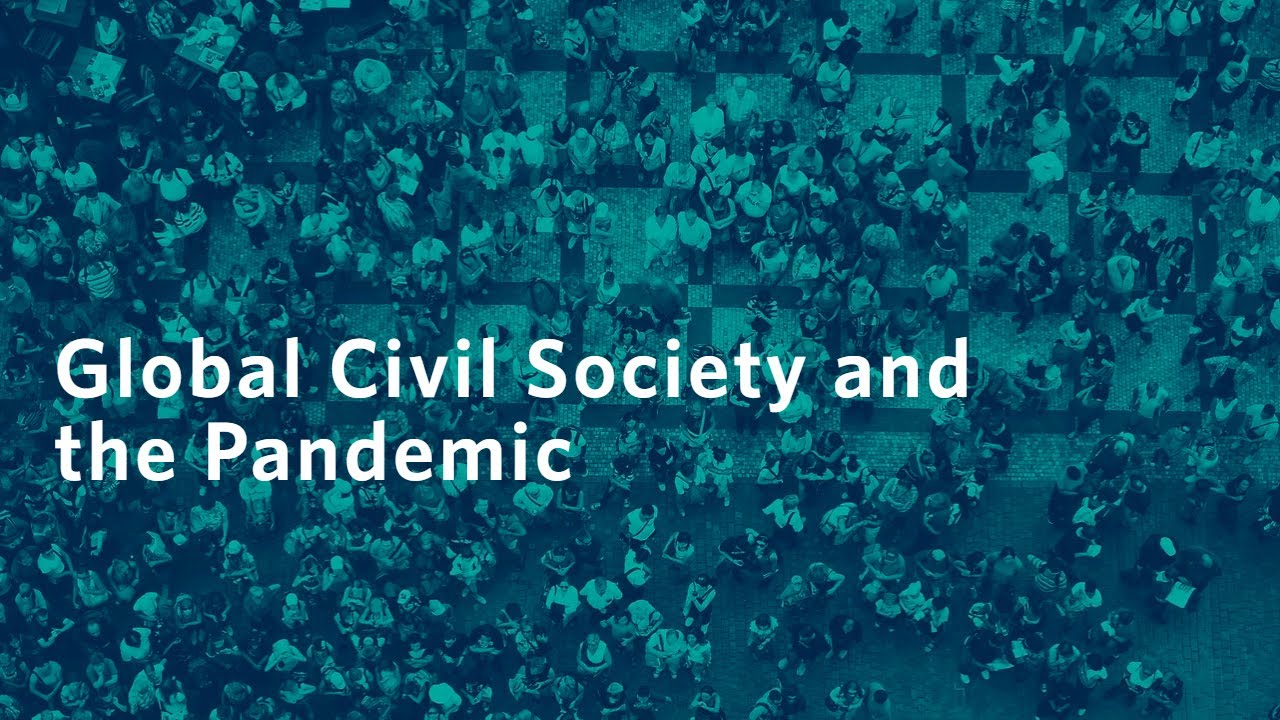
Image Credit: Carnegie
Watch Thomas Carothers and the Carnegie’s global Civic Research Network discussion on how civil society is responding to the pandemic and what the longer-term consequences could be for civic activism.
Books that won’t balance
It is already clear that the ravages of COVID-19 are not confined to people’s health, but to government coffers. Governments are facing harsh fiscal decisions everywhere, but some will have it tougher than others. A case in point is Papua New Guinea. Satish Chand, Junaid Sadiq Masoood and Vijaya Ramachandran offers a snapshot of fiscal realities.
All-the-more reason then to be transparent as to the realities to inform debates on how to respond. Accordingly, the Global Initiative for Fiscal Transparency has launched the Fiscal Data for Emergency Response Guide for COVID19 to help identify data that should be gathered and disclosed. Pair with International Budget Partnership’s call on governments to achieve four open budgeting targets in the next 5 years: full budget transparency; engage public input; better oversight of budget execution; and sustain improvements in budgeting accountability.
The government of Sierra Leone is leading by example with a public update on donation and utilization of Covid19 funds so far, while Hasaan Khawar asks if Pakistan is becoming less transparent given that the country’s score on budget transparency in the latest Open Budget Survey has come tumbling down from 44 to 28 within two years.
Advocates for tax justice are praising the Scottish government’s move to block COVID19 bailouts for corporations linked to tax havens, while Marietje Schaake writes on the urgency for digital tax reform and assuring those platforms that have benefited from the pandemic contribute to recovery through tax contributions.
Tim Jones of the Jubilee Debt Campaign writes on the need for transparent government lending and borrowing amid crippling debt for so many countries. Eurodad calls for debt standstills to be imposed via an existing mechanism in the IMF Articles of Agreement.
Jackie Harvey advocates for the need to increase the transparency of beneficial ownership registers, while addressing hurdles to interpreting such data. The Uganda Debt Network calls for a multi-stakeholder COVID-19 Transparency Partnership in Uganda and across East Africa.
Meanwhile, resource-dependent countries are figuring out how to handle steep falls in prices and hence revenues and the likelihood of an accelerated transition away from fossil fuels; NRGI spotlights how Nigeria and the Democratic Republic of the Congo may fare, though it remains unclear exactly how much production will actually return. Continuing its blog series, NRGI then looks at how fossil fuel interest will affect domestic, clean energy, transitions. Meanwhile, EITI lists next steps for Guyana in contract transparency, as they scale oil shipments amid the sharply reduced demand brought on by COVID19.
Owning up
OpenOwnership list their top five areas in which beneficial ownership transparency is key in addressing coronavirus concerns. Jackie Harvey adds her voice on the need to increase the transparency of beneficial ownership as Che Sidanius, Global Head of Financial Crime and Industry Affairs at Refinitiv reminds us of the importance of better quality and beneficial ownership data.
In a reminder of why it matters, OCCRP traced the ownership of investment firms linked to the Kyiv call center to shell companies in Estonia and the Caribbean. This kind of network is commonly used to hide the origins of illicit money. The investigation focused on the ostensible owners of these shell companies: ordinary Swedes who are led to function as proxies in the scheme.
BuzzFeed writers unpack how Ukrainian oligarch can take advantage of current US rules for alleged money laundering as The Economist highlights how the COVID-19 is presenting fresh opportunities for organized crime. Monica Kirya complains government’s pandemic response doesn’t give enough consideration to integrating anti-corruption plans and policies but says the crisis provides an opportunity for countries to strengthen their anti-corruption efforts.
Abigail Bellows and Alexandra Wrage discuss the prospective US CROOK Act and the benefits that an anti-corruption action fund could have for U.S. anti-corruption work on the wonderfully named “Bribe, Swindle, or Steal” podcast.
Essential Listening #2: Out of Order: Frontlines of Democracy: The Perfect Storm, Coronavirus, Corruption, and Freedom of the Press
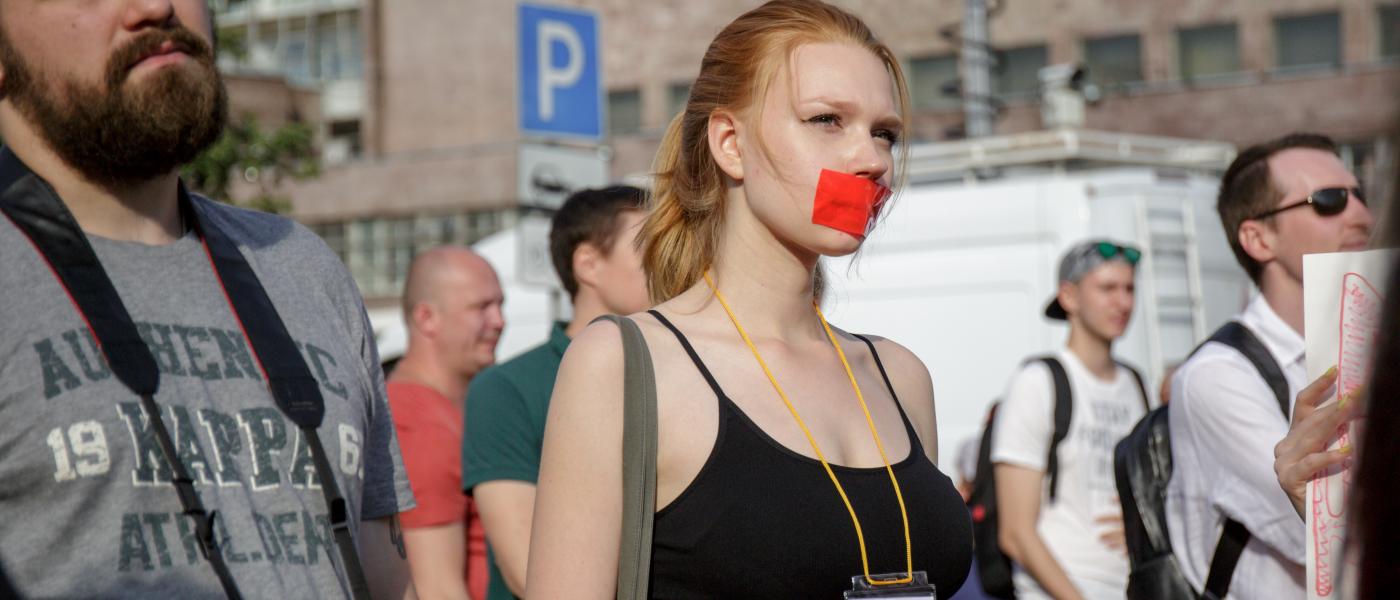
Photo Credit: Irina Boldina / Shutterstock
Listen to the World Press Freedom edition of the Out of Order podcast and learn how the media is navigating places where corruption and democratic backsliding are on the rise as some leaders seek to take advantage of the pandemic for their gain.
Throttling up
Three professors of Leiden University, Netherlands studied the timing of European governments response to the COVID-19 and their findings be counterintuitive to some – certainly openness is not associated with rapid response to the virus.
This might worry Stuti Khemani who worries that governments will waste a windfall of legitimacy conferred by being first line of defense amid the pandemic. She argues this can be an opportunity to build trust in public institutions, but it will require donors and country reform leaders to adapt from standard practice.
As things stand, the trend is looking more in the other direction. No doubt, the warning signs highlighted in the 2020 World Press Freedom Index have begun to manifest. International Media Support reminds us that we all have a responsibility to safeguard the press in this perilous times – they highlight lessons, approaches, and proactive solution to address media safety threats everywhere. Meanwhile, Saul Mullard worries about media clampdowns for anti-corruption efforts and urges an independent fund for public interest media.
That’s a view likely to be endorsed by the Center for Independent Media Assistance who are flagging the rise of internet throttling (intentional slowing of an internet service by an internet service provider) as a censorship tool to press freedoms, democracy, and human rights. The report includes case studies on India, Jordan, and Venezuela.
In Burundi, the government blocked access to social media platforms on Election Day as voters went to polls to elect a new president to replace long-serving President Pierre Nkurunziza. It also blocked election observers from East Africa Community and already expelled UN bodies and foreign media; raising red flags on human rights abuse and curtailing already restrictive space for civil society and media. The Division of Electoral Assistance and Civil Society of the Council of Europe have also put together a compendium of all the standards set by the Council of Europe concerning elections, digital technologies and human rights.
Good to checkout Tom Wein’s thought-provoking framework for understanding bitter attacks on civil society (it prompted us to dig out TAI’s past report on how some governments seek to Distract, Divide, Detach civil society and how the transparency community can respond.)
Finally, worries over contact tracing apps deepen this week as Global Witness exposes “Alerta Guate”, a COVID-19 tracing app for Guatemala, with questionable data practices. The app is engineered to track users’ locations even when closed and stores data for up to a decade – far beyond the estimated duration of the pandemic. Guatemala’s president, Alejandro Giammattei, who endorsed the app, has said he hopes it will evolve to cover “security issues”, but hasn’t elaborated further.
Check out Covid Tracing Tracker, a database to capture details of every significant automated contact tracing effort around the world and CovidMeasures, a project created by citizens for citizens that tracks worldwide government responses to COVID-19 and their impact on citizens.
TAI SPOTLIGHT:

The Chandler Foundation Joins TAI Collaborative to Promote Transparency and Accountability |Transparency and Accountability Initiative
We are pleased to welcome the Chandler Foundation as the newest member of the Transparency and Accountability Initiative (TAI) funder collaborative. As a member of TAI, the Chandler Foundation is joining efforts to boost the impact of global transparency, participation and accountability funding in support of inclusive and equitable development.
Larry Kramer on What Donors Want | Hewlett Foundation
Rachel Stephenson Sheff and Alfonsina Peñaloza, Programme Officer at the Foundation interviewed Hewlett’s President, Larry Kramer, to understand the role of leadership in effective philanthropy, the importance of collaboration among funders, and the need to provide grantees with long-term support.
The New/Mode Accessibility Fund | Luminate
In partnership with New/Mode, Luminate has launched an Accessibility Fund to help orgnisations working on just recovery from COVID-19. These organizations will have subsidized access to New/Mode’s advocacy and civic engagement platform.
How philanthropy can help women in the COVID-19 crisis| Open Society Foundations
Open Society Foundations Director of the Women’s Rights Program, Kavita N. Ramdas, wants philanthropy organization to respond to Covid-19 by focusing on the impact on women. “Grave gender injustices, intersected with racial and economic injustice, are bubbling to the surface and exacerbated during this pandemic in ways that are both disturbing and sobering.”
Ford Foundation President Darren Walker’s address to the SIPA Class of 2020 | Ford Foundation
Ford Foundation President, Darren Walker addressed the Columbia School of International and Public Affairs (SIPA) Class of 2020 on their Virtual Graduation Celebration and tasked them to shape the postCOVID-19 world toward justice and fairness. “Now it is your turn… to redefine global citizenship and model just leadership for this new history as we begin together…Today the world has changed forever and you will change it for the better.”
Job Listings
- Reset. Resident fellowship – July 1, 2020
- Job postings at Ford Foundation – Ongoing
Job postings at Luminate – Ongoing
Job postings at Democracy fund – Ongoing - Government Affairs Senior Policy Advisor, International Financial Institutions at Oxfam – Ongoing
- (Senior) Research Scientist for AidData Underreported Financial Flows Program – June 12, 2020
- Reset. Information control fellowship – July 1, 2020
Calls/Opportunities
- IBM call for Code Covid-19 Global Challenge – July 31, 2020
Amartya Sen essay contest 2020: Illicit financial flows – August 31, 2020
Call for submissions to SSIR Series: Social change in an era of extreme polarization – Last Thursday of every month until early 2021 - BetterTogether Challenge for innovators – Ongoing
- Free Digital Security Training – Ongoing
Open Road Alliance Charitable Grant and Loan to organizations responding directly to COVID-19 – Ongoing - Marielle Franco Award for feminist essays 2020 – June 16, 2020
- Open call for grants funding on social accountability and transparency in the national education sector – June 19, 2020
- Proposal: Working together to improve governance and anticorruption (Central and Eastern Europe focused) – June 30, 2020
- Reset our future fund for organizations and people using technology, research, and education that help tackle these challenges – July 1, 2020
- Policy and engagement consultant at ICTD DIGITAX programme – May 24, 2020
- Change Leaders in Philanthropy Fellowship – (application opens on June 2020)
- Pulitzer Center Coronavirus news collabortion challenge – Applications will be reviewed on a first-come, rolling basis
Call for proposals: Informality, tax, and the state – Proposals accepted on a rolling basis - Call for suggestions on humanitarian and development data forum agenda – May 2020
- Media integrity contest for South Africans – May 19, 2020
Summer school for journalists open for Russian citizens – May 20, 2020
Call for applications: Intensive anti-corruption training for future leaders – May 20, 2020
Rapid-Response Grants on Covid-19 and the Social Sciences – June 1, 2020
Proposal submission for the 2020 Summer Evaluation Institute – June 7-10, 2020
Calendar
Please double check the websites for these events to make sure they are still happening – many are subject to change due to the spread of coronavirus.
- Transparency International: 19th International Anti-Corruption Conference – (Postponed)
2020 OECD anticorruption & integrity forum webinar —May 20, 2020 (11:00am Paris time) - Emergency measures to protect whistleblowers and promote reporting during the COVID-19 crisis and beyond – May 22, 2020 (2pm Paris time)
- Webinar: Advancing community rights through peace building – May 27, 2020 (12:00 –12:45 PM PT over Zoom)
- Health versus Wealth? Tax & Transparency in the Age of COVID-19 – May 28, 2020 (9am -10:30am EDT)
- Virtual event: Health versus Wealth? Tax and transparency in the age of Covid-19 – May 28, 2020 (13:00 to 15:30 CUT)
- Awaken for Impact: Engage for Good 2020 virtual conference – May 28, 2020
2020 Media Impact Forum (funder-only gathering) – June 2, 2020 (New York, United States of America) - Civic Power in a Pandemic – June 2, 2020 (5pm – 6:30pm)
- Human Rights Litigation Summer School at Berlin, Germany – June 8-12, 2020
Women and Girls Africa Summit – June 9-12, 2020 (Durban, South Africa)
RightsCon 2020 – June 9-12, 2020 (San Jose, Costa Rica)
2020 Neighborhood Funders Group National Convening (philanthropy support to grassroots power building) – June 29 – July 1, 2020 (Washington, DC)
WE EMpower UN SDG Challenge 2020 – September 18 – 27, 2020 (New York City, United States of America)
The 2020 Journalism Funders Gathering (funder-only gathering) – October 6-7, 2020 (Philadelphia, United States of America)
Humanitarian and Development Data Forum – November 2-4, 2020 (Chambery, France)
International Open Data Conference –November 18-20, 2020 (Nairobi, Kenya).

